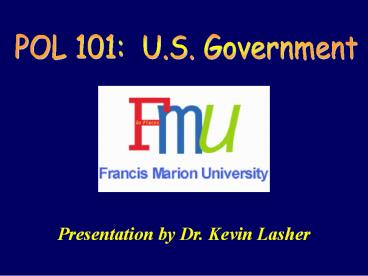POL 101: U.S. Government - PowerPoint PPT Presentation
1 / 30
Title:
POL 101: U.S. Government
Description:
Title: No Slide Title Author: kevin lasher Last modified by: Kevin Lasher Created Date: 11/2/1999 4:18:31 AM Document presentation format: On-screen Show (4:3) – PowerPoint PPT presentation
Number of Views:69
Avg rating:3.0/5.0
Title: POL 101: U.S. Government
1
POL 101 U.S. Government
Presentation by Dr. Kevin Lasher
2
Government Intervention in Economy
FOR AGAINST
Govt. Intervention in Personal Matters
AGAINST FOR
LIBERALS
LIBERTARIANS
POPULISTS
CONSERVATIVES
3
Political Parties
- Definitions
- Roles of political parties
- Why two parties?
- History of US political parties
4
US Political Parties
- Political parties are NOT mentioned in the U.S.
Constitution - Founders were hopeful that we would avoid
political parties
5
US Political Parties Definition
- Political party is a broadly-based coalition
which attempts to gain control of the government
by winning elections - Focus is on political parties in democracies,
especially the United States
6
Political Parties in non-democracies
- The Communist Party in China shares some of
these characteristics - Big difference is lack of competitive elections
7
Roles of US Political Parties
- Recruit and select candidates
- Provide public policy alternatives
- Organize government
- Channel conflict
8
Recruit and Select Candidates
- American parties locate and help choose
candidates for all offices - There was a time when each party picked
candidates in smoked-filled rooms - Parties still do some of that, but mostly
candidates run within primaries (intra-party
elections)
9
Recruit and Select Candidates
Parties have more influence at state and local
level At the core, parties provide labels for
relatively uninformed voters
10
Provide Public Policy Alternatives
- Democrats and Republicans offer different types
of policy solutions to various national problems - Democrats propose more liberal policies
Republicans propose more conservative policies
11
Provide Public Policy Alternatives
- Legislation is much more than just half and half
compromise between the two parties - Democrats may have two or three versions of a
bill and same for Republicans
12
Provide Public Policy Alternatives
- Every four years, both parties create
platforms that summarize the issue positions of
their partys presidential candidate
13
Organize Government
- House and Senate leadership and committees are
divided by party (and party strength) - House Republican Speaker and Republican
majorities on all committees
14
Organize Government
- President Obama appoints mostly Democrats to
serve in the Executive Branch departments (and
President Bush appointed mostly Republicans)
15
Organize Government
- While SC Justices do not have formal party
affiliations, they can be identified as liberal,
moderate or conservative - Democratic presidents will nominate more liberal
judges and Republicans will nominate more
conservative judges
16
Channeling Conflict
- American parties both create and limit conflict
- They create the parameters of the political
debate - Democrats and Republicans agree on many policy
fundamentals, while arguing policy details
17
Channeling Conflict
National Health Care
Pay Own Health Care
Health Care Policy
18
Why Two US Political Parties?
- North-South differences
- Single member district plurality (SMDP) electoral
system - Capitalist politics
- Moderate American public
- Election laws biased toward existing parties
- Political Socialization
19
North-South Differences
- From 1860-1960 the Solid South was solidly
Democratic - The Republicans dominated the North and West
(although not quite as much) - This is NOT the case today, with much of the
South becoming Republican
20
Single Member District Plurality (SMDP) Electoral
System
21
Single Member District Plurality (SMDP) Electoral
System
Seven SC districts 435 House districts
nationally SMDP systems are very likely to
create two large parties fighting for the
majority/plurality New Gamecock Party wins
about 20 of the vote in each district How many
seats do they win with their 20 ? NONE
22
Single Member District Plurality (SMDP) Electoral
System
District One Republican 42 Democrat
38 Gamecock 20 District
Two Republican 52 Democrat
28 Gamecock 20 District
Three Republican 35 Democrat
45 Gamecock 20
23
Single Member District Plurality (SMDP) Electoral
System
SMDP systems make it difficult for new parties
to emerge and survive Because they rarely win
elections and eventually disappear (or fall into
being irrelevant) Proportional representation
(PR) systems make it easier for third and fourth
parties to be created and survive
24
Proportional Representation (PR) Electoral System
SC Republicans 57 4 seats State-wide
Democrats 28 2 seats Gamecock
15 1 seat National 15 65
seats Gamecock
25
Capitalist Politics
- Two main political parties are generally
supportive of the capitalist economic system - Parties of the far left (socialist and
communist) are almost unknown in the US - Democrats and Republicans argue about the nature
of American capitalism
26
Moderate American Public
- Americans also reject parties of the far right
(neo-fascist parties) - As the wealthiest country in the world, it is
understandable that MOST Americans are fairly
supportive of the status quo - Are the American people becoming less moderate?
27
Biased Election Laws
Election laws are written in legislatures in 50
states controlled by either of the two major
parties Democrats and Republicans are not
going to create election laws that make it EASY
for a competitive third party to be born and
survive
28
Political Socialization
- We grow up learning that there are basically two
political parties in the United States - We have had the same two political parties since
1860s - Democrats and Republicans is what we expect
29
History of US Political Parties
- 1790s-1828 Democ-Republicans vs. Federalists
- 1828-1860 Democrats vs. Whigs
- 1860-1896 Democrats Republicans
- 1896-1932 Republicans gt Democrats
- 1932-1980 Democrats gt Republicans
- 1980 now Democrats Republicans (???)
30
The End































